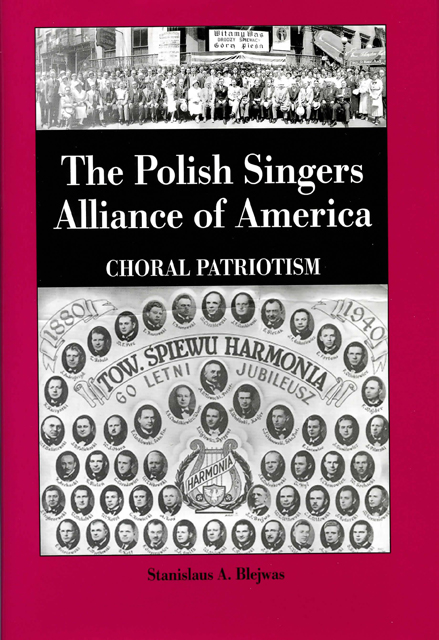Book contents
- Frontmatter
- Contents
- List of Illustrations
- Foreword
- Acknowledgments
- Introduction
- 1 “To Sing Out the Future of Our Beloved Fatherland”
- 2 Pieśni o ziemi naszej (Songs of Our Land)
- 3 The Convention of “Unhappy Memory”
- 4 “Active Duty”
- 5 “Cultural Care”
- 6 World War II and a New Immigration
- 7 The Czechlewski Years: The Ideological Organization Redefined
- 8 Polish American Choral Culture
- 9 “Let Poland Be Poland!”
- 10 Quo Vadis Polish Song in North America?
- Appendix A PSAA National Officers
- Appendix B National Conventions
- Appendix C Individual Choirs
- Appendix D Honorary Members
- Appendix E Compositions of Antoni Małłek Celebrating the Holy Trinity Immigrant Neighborhood in Chicago
- Appendix F Membership
- Appendix G Hlond Trophy Winners
- Appendix H Children’s Choirs
- Appendix I Selected Biographies
- Appendix J Competition Songs, Winning Choirs, and Free Selection at National Conventions of the Polish Singers Alliance of America
- Appendix K Guest Artists and Selections Performed at National and International Conventions of the Polish Singers Alliance of America, 1905–1998
- Appendix L Songs Sung by Choirs at Concerts of the National and International Conventions of the Polish Singers Alliance of America
- Appendix M PSAA Districts and Choirs—1999
- Notes
- Bibliography
- Index
8 - Polish American Choral Culture
Published online by Cambridge University Press: 17 March 2023
- Frontmatter
- Contents
- List of Illustrations
- Foreword
- Acknowledgments
- Introduction
- 1 “To Sing Out the Future of Our Beloved Fatherland”
- 2 Pieśni o ziemi naszej (Songs of Our Land)
- 3 The Convention of “Unhappy Memory”
- 4 “Active Duty”
- 5 “Cultural Care”
- 6 World War II and a New Immigration
- 7 The Czechlewski Years: The Ideological Organization Redefined
- 8 Polish American Choral Culture
- 9 “Let Poland Be Poland!”
- 10 Quo Vadis Polish Song in North America?
- Appendix A PSAA National Officers
- Appendix B National Conventions
- Appendix C Individual Choirs
- Appendix D Honorary Members
- Appendix E Compositions of Antoni Małłek Celebrating the Holy Trinity Immigrant Neighborhood in Chicago
- Appendix F Membership
- Appendix G Hlond Trophy Winners
- Appendix H Children’s Choirs
- Appendix I Selected Biographies
- Appendix J Competition Songs, Winning Choirs, and Free Selection at National Conventions of the Polish Singers Alliance of America
- Appendix K Guest Artists and Selections Performed at National and International Conventions of the Polish Singers Alliance of America, 1905–1998
- Appendix L Songs Sung by Choirs at Concerts of the National and International Conventions of the Polish Singers Alliance of America
- Appendix M PSAA Districts and Choirs—1999
- Notes
- Bibliography
- Index
Summary
Amateur choral singing, as discussed in the opening chapters, emerged in both Poland and in the United States in the late 19th century. In the United States, the amateur choral movement also flourished among immigrant groups from Germany, Scandinavia, and among other East European groups, including the Croats, Slovaks, Czechs, Hungarians, Lithuanians, Serbs, Slovaks, and Ukrainians. The movements in Poland and among the Polish immigrants in America are remarkable because they came into existence when a Polish state was not to be found on Europe's map. Within the political context, amateur choral singing was an extension of the struggle for the preservation of national culture and the restoration of homeland independence. Amateur choirs played supporting roles. They provided the songs for thousands of patriotic commemorations and volunteers for General Józef Haller's Blue Army and for the American Armed Forces during World War I and II. Choirs also cultivated the national culture through the promotion of Polish song at an even greater number of concerts. Immigrant choirs were a necessary and prominent element for what scholars describe as the public display of ethnicity.
It is impossible to tell the story of every one of the more than 300 choirs that at one time or another belonged to the Polish Singers Alliance of America. In too many cases, only the name, the choir's assigned membership number, and its location survive in the existing records. It is possible, however, to characterize the role and the importance of the amateur choir for the immigrant and ethnic community, and attempt to describe Polish American choral culture. The activities and repertoire of parish choirs and secular singing societies are the local foundation of this culture, the foundation upon which rests national organizations like the Polish Singers Alliance and the United Choirs of the Polish National Catholic Church.
Choirs and Community
Song in immigrant life can be studied from several perspectives. It was an integral element of what a sociologist would call the immigrant's cultural baggage. It was a key part of the native religious and cultural heritage that immigrants carried across the ocean. Prior to 1854, political émigrés and exiles constituted the Polish immigration to America. After 1854, rural immigrants dominated the migration.
- Type
- Chapter
- Information
- The Polish Singers Alliance of America 1888-1998Choral Patriotism, pp. 126 - 159Publisher: Boydell & BrewerPrint publication year: 2005



